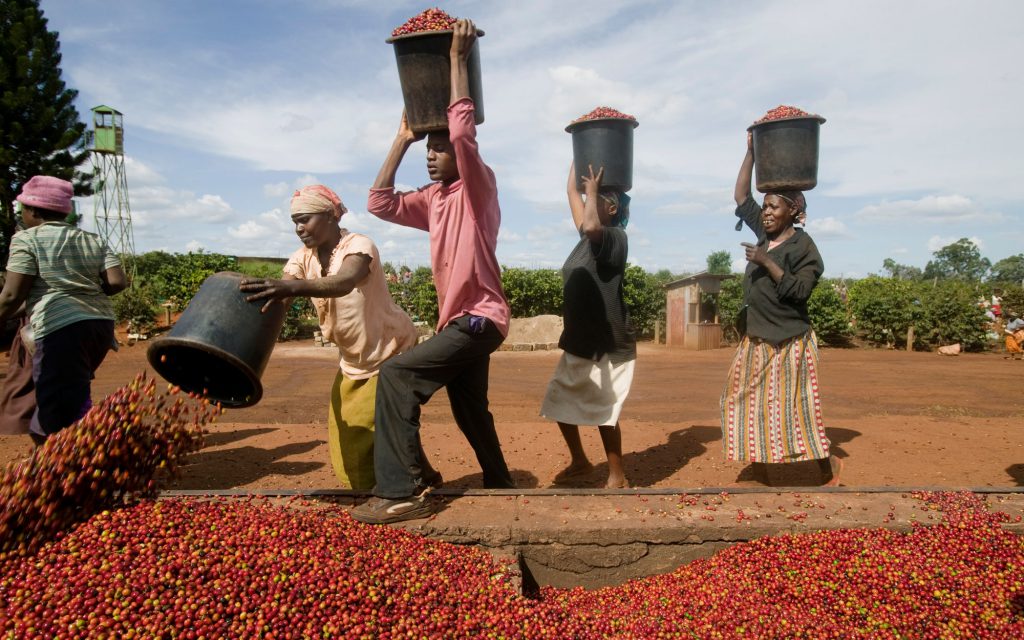Can Digital Cooperatives Expand Financial Access in Kenya, Uganda, and Tanzania?

Image credit: Ndirangu Ngunjiri Muthuani Coffee Factory- Nyeri
Across Africa, over 400 million adults remain excluded from formal financial systems, lacking access to services like savings accounts, loans, or insurance (World Bank Group African Enda). This exclusion disproportionately affects rural communities, small-scale farmers, women, and youth, perpetuating poverty. However, cooperatives are stepping in as a powerful solution, leveraging digital platforms, mobile money, and blockchain systems to improve financial access, enhance transparency, and lower transaction costs.
Cooperatives, particularly Savings and Credit Cooperative Organizations (SACCOS), are vital for underserved communities. These member-driven organizations offer tailored financial products, building trust among farmers and entrepreneurs. In rural areas across Kenya, Uganda, Tanzania, and Ghana, cooperatives are often the only link to formal financial systems. Kenya’s 15,000 SACCOS, for example, serve 14 million members, providing essential financial services in regions with limited banking infrastructure.
The mobile revolution in Africa is transforming financial inclusion. Mobile banking allows millions to bypass traditional infrastructure, enabling them to send money, pay bills, save, and access loans with ease. Platforms like M-Pesa, MTN Mobile Money, and Airtel Money extend these services even to remote areas. In Kenya, M-Pesa revolutionized savings and loans, while the Uganda Cooperative Savings and Credit Union uses mobile money to improve access. Rose, a smallholder farmer in Kenya, for example, shared how mobile banking eliminated costly trips to the bank, allowing her to focus on farming and manage her finances efficiently.
Digital savings and loan products are advancing this transformation. For instance, Farmerline in Ghana developed Mergdata, a platform that simplifies loan applications for smallholder farmers using mobile money and digital profiles. Similarly, savings groups in Tanzania, such as the PCI Women Empowered groups, use the DreamSave app to track savings and loans, enhancing transparency and efficiency.
Blockchain technology offers cooperatives secure, transparent financial transactions through decentralized, unalterable ledgers. In Zimbabwe, Blue Marble Microinsurance uses blockchain for crop and livestock insurance, ensuring fair claims processing for smallholder maize farmers. However, despite its promise, blockchain faces risks such as phishing, smart contract vulnerabilities, and fraudulent schemes.
Digital cooperatives also provide affordable insurance, reducing risks from crop failures, health crises, and accidents—critical in rural areas where families are most vulnerable. By fostering investments in education, healthcare, and local businesses, these tools create a cycle of economic growth that benefits entire communities.
Yet challenges remain. Poor internet connectivity in rural areas often limits the efficiency of digital platforms, making it difficult for members to access mobile banking or loans. A supportive regulatory environment is also essential. Governments must ensure data protection, fair competition, and consumer rights. Countries like Kenya, Nigeria, and Ghana have introduced mobile money regulations, but consistent policies across the continent are needed.
The prospects for platform cooperatives in Africa are immense. With expanding mobile networks, improving digital literacy, and increased government support, millions more could benefit. Scaling these efforts will require innovative partnerships between cooperatives, fintech companies, and governments. By digitalizing their operations, cooperatives are building an inclusive and transparent financial ecosystem that has the potential to transform financial inclusion across Africa.
Learn more about the author.